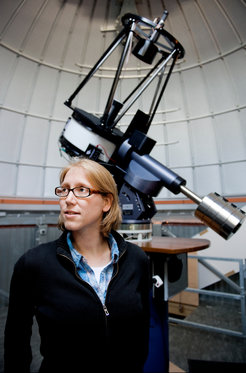European Early Career Prize for Saskia Hekker
The European Astronomical Society honors scientist from the Max Planck Institute for Solar System Research with the MERAC Prize.
Dr. Saskia Hekker from the Max Planck Institute for Solar System Research (MPS) is awarded this year’s MERAC Prize for Observational Astrophysics by the European Astronomical Society (EAS). The EAS honors Hekker’s pioneering contributions to the understanding of the internal structure of red-giant stars. Every year the MERAC Prize recognizes three young scientists in the categories “Theoretical Astrophysics”, “Observational Astrophysics”, and “New Technologies”.
The internal structure of a star can be unriddled only indirectly. Helpful in this endeavor are oscillations caused by massive plasma flows in the star’s atmosphere. These vibrations propagate into the interior of the star, where they are altered at the transitions between different layers. Evidence of this can be traced with the help of telescopes on the surface of a star and thus allow conclusions about its internal structure. Saskia Hekker applies this method called asteroseismology primarily to red giants, particularly large and luminous stars.

Already during her PhD, Hekker announced non-expected, non-radial oscillations in these stars which she then confirmed using data of the French CoRoT satellite. She was also heavily involved in the discovery, identification, and analysis of oscillations which make it possible to differentiate between two different kinds of red giants: those that only burn hydrogen in their interior and those in which also the fusion of helium nuclei occurs.
In addition, Hekker discovered the first red giant in a binary system that occasionally hides its partner in a kind of eclipse and developed methods to determine global asteroseismic parameters which she then applied to data from NASA’s space probe Kepler of planet-hosting stars.
Since the beginning of this year, Dr. Saskia Hekker heads the Max Planck Research Group “Stellar Ages and Galactic Evolution” at the MPS. After receiving her doctorate in 2007 at the University of Leiden in the Netherlands, she did research at the Royal Observatory of Belgium and at the University of Birmingham in England. In 2011 she received the prestigious Veni Fellowship of the Netherlands Organization for Scientific Research to continue her work at the Astronomical Institute "Anton Pannenkoek" of the University of Amsterdam. Since 2013 Hekker’s scientific home is the MPS in Göttingen where she was awarded a Starting Grant of the European Research Council.
Every year, the European Astronomical Society awards the MERAC Prize to three scientists in the categories “Theoretical Astrophysics”, “Observational Astrophysics”, and “New Technologies”. In even years, the prize distinguishes excellent PhD-theses, in odd years early career researchers.
